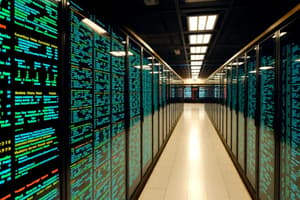Podcast
Questions and Answers
What are the three fundamental roles of Information Systems (IS) in business?
What are the three fundamental roles of Information Systems (IS) in business?
Support of Strategies for Competitive Advantage, Support of Business Decision Making, Support of Business Processes and Operations
What are the components of a system?
What are the components of a system?
Input, Processing, Output, Feedback and Control
What are the two main types of software resources?
What are the two main types of software resources?
System Software and Application Software
What is the difference between data and information?
What is the difference between data and information?
What are the five basic information system activities?
What are the five basic information system activities?
Which of the following is NOT a benefit of using Information Systems (IS)?
Which of the following is NOT a benefit of using Information Systems (IS)?
The IS function is a major functional area of business, just as important as any other business function.
The IS function is a major functional area of business, just as important as any other business function.
Information Systems (IS) can be used to support business processes, managerial decision making, and strategies for competitive advantage.
Information Systems (IS) can be used to support business processes, managerial decision making, and strategies for competitive advantage.
Which of the following is an example of e-business?
Which of the following is an example of e-business?
What is the purpose of Enterprise Collaboration Systems?
What is the purpose of Enterprise Collaboration Systems?
E-Commerce involves buying, selling, marketing, and servicing products, services, and information over computer networks.
E-Commerce involves buying, selling, marketing, and servicing products, services, and information over computer networks.
In the context of Information Systems, what does 'feedback' refer to?
In the context of Information Systems, what does 'feedback' refer to?
Flashcards
Information System (IS)
Information System (IS)
A system that uses technology to collect, process, store, and disseminate information within an organization.
Input (IS)
Input (IS)
The initial data or raw materials that are entered into an information system for processing.
Processing (IS)
Processing (IS)
The transformation of input data into useful information.
Output (IS)
Output (IS)
Signup and view all the flashcards
Feedback (IS)
Feedback (IS)
Signup and view all the flashcards
Control (IS)
Control (IS)
Signup and view all the flashcards
IS Resources (people)
IS Resources (people)
Signup and view all the flashcards
IS Resources (hardware)
IS Resources (hardware)
Signup and view all the flashcards
IS Resources (software)
IS Resources (software)
Signup and view all the flashcards
Data Resources
Data Resources
Signup and view all the flashcards
Information Resources
Information Resources
Signup and view all the flashcards
Network Resources
Network Resources
Signup and view all the flashcards
Competitive Advantage
Competitive Advantage
Signup and view all the flashcards
Business Decision Making
Business Decision Making
Signup and view all the flashcards
Business Processes
Business Processes
Signup and view all the flashcards
E-Business
E-Business
Signup and view all the flashcards
E-Commerce
E-Commerce
Signup and view all the flashcards
Enterprise Collaboration Systems
Enterprise Collaboration Systems
Signup and view all the flashcards
IS Function
IS Function
Signup and view all the flashcards
IS Specialist
IS Specialist
Signup and view all the flashcards
End-User
End-User
Signup and view all the flashcards
Study Notes
Chapter 1: Foundations of Information Systems in Business
- Introduction to Information Systems, 16th Edition, by Marakas and O'Brien
- Copyright 2013 McGraw-Hill
- Learning Objectives covered in the chapter
Learning Objectives
- Understand systems and how they relate to information systems
- Explain the importance of information systems knowledge for business professionals
- Identify five areas of information systems knowledge needed by professionals
- Give examples of how business applications of information systems support firm's processes, managerial decision-making, and competitive advantage
- Provide examples of major types of information systems from real-world business organizations
- Identify challenges business managers face in managing successful and ethical information technology development and use
- Provide examples of components of real-world information systems, demonstrating how people use hardware, software, data, and networks to transform data into information products
- Demonstrate familiarity with career opportunities in information systems
Section 1: Foundation Concepts: Information Systems in Business
- Information systems are crucial in business administration and management
- Information technology (IT) and internet technologies play key roles in improving business process effectiveness and efficiency, decision-making, and collaboration
II. The Fundamental Roles of IS in Business
- Information systems support strategies for competitive advantage, decision-making, and business processes/operations
IV. The Role of E-Business in Business
- E-business uses internet technologies to enhance business processes, e-commerce, and enterprise collaboration with customers, suppliers, and stakeholders
- Enterprise collaboration systems support networked team communication, coordination, and collaboration
- E-commerce involves buying, selling, marketing, and servicing products/services over computer networks
VI. Managerial Challenges of Information Technology
- Information Systems (IS) are a major, vital business function
- IS contributes to operational efficiency, employee productivity/morale, customer service/satisfaction, and strategic resources
Section 2: Foundation Concepts: The Components of Information Systems
- This section explores the key components of information systems
I. System Concepts: The Foundation for Business Processes
- Systems have inputs (data to be processed), processing (transforming data into information), outputs (disseminating information to destinations), feedback (information about performance), and control (measuring feedback to ensure objectives are met)
III. Information System Resources
- People Resources: IS specialists and end-users
- Hardware Resources: Computing devices and storage media
- Software Resources: Programs and instructions that tell the computer what to do (system and application software), along with procedures for use.
- Data Resources: Unorganized facts and figures (data) that transform into useful information for the organization
- Network Resources: Communications media and network infrastructure (hardware, software, and technologies) for establishing communication networks.
IV. Information System Activities
- Input of data resources (capturing data)
- Processing of data into information (organizing, analyzing, and manipulating data)
- Output of information products (disseminating information to appropriate users)
- Storage of data resources
- Control of system resources (monitoring feedback to ensure performance standards are met)
Studying That Suits You
Use AI to generate personalized quizzes and flashcards to suit your learning preferences.




